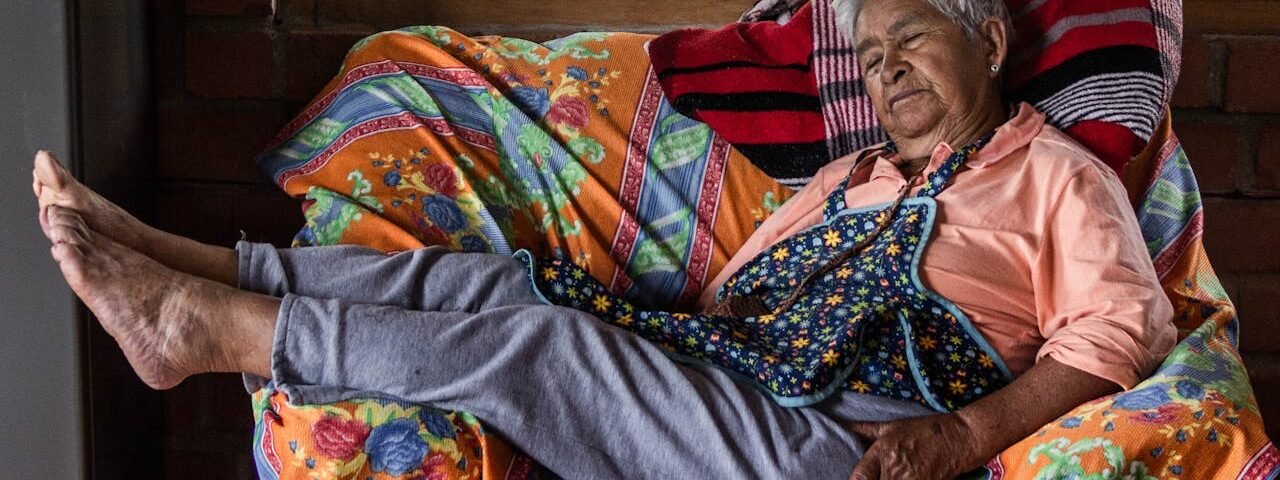We’ve all heard the joke. How do you fall asleep in a living room chair? 1) Be old; and 2) Sit in a chair. So my question is, if it’s so easy to fall asleep in a chair, why can’t I sleep at night?
Insomnia—it’s the frustrating inability to fall asleep or stay asleep, and it often feels like a cruel trick played on us as we age. Many retirees find that despite having fewer responsibilities or a quieter household, sleep becomes more elusive. So, what gives? Why is insomnia so common as we get older?
Age and Insomnia
As we age, our sleep patterns naturally change. The production of melatonin, a hormone that regulates sleep, decreases, making it harder to fall asleep. Additionally, seniors often face new challenges, such as changes in health, a decrease in physical activity, and increased stress or anxiety about the future. These factors can all contribute to insomnia, making it more difficult to get the restful sleep we once took for granted.
But don’t worry—there’s hope! If you’re struggling with insomnia, there are practical strategies you can use to reclaim your sleep. Below, we’ll explore some of these strategies, from lifestyle changes to handy apps, all designed to help you get the rest you deserve.
Practical Tips to Combat Insomnia
Create a Relaxing Bedtime Routine and Stick to a Sleep Schedule. Engage in calming activities before bed, like reading a book, taking a warm bath, or practicing deep breathing. Keep your bedroom cool, dark, and quiet. Invest in a comfortable mattress and pillows. Avoid screens, as the blue light can interfere with your sleep. If noise is an issue, consider using earplugs or a white noise machine. Also, establishing a consistent sleep schedule can train your body to expect sleep at certain times. Go to bed and wake up at the same time every day, even on weekends.
Watch What You Eat and Drink. There’s a reason the senior early bird discount at restaurants is around 4 pm. Eating earlier and avoiding large meals, caffeine, and alcohol close to bedtime boasts your ability to fall asleep. Eating a light snack that includes tryptophan, such as a banana or yogurt, can also promote sleep.
Get Moving, but Not Too Late. Regular physical activity can help you fall asleep faster and enjoy deeper sleep. Aim for 30 minutes of moderate exercise most days of the week but avoid vigorous activity close to bedtime. Remember that while a short nap can be refreshing, long or late-afternoon naps can interfere with nighttime sleep. Limit your naps to 20 – 30 minutes.
Manage Stress and Anxiety and Get a Dose of Sunshine. Try relaxation techniques such as meditation, deep breathing, or progressive muscle relaxation. Journaling your thoughts before bed can also help clear your mind. Don’t forget spending time outside during daylight hours can help with your mood and regulate your sleep-wake cycle. Aim to get at least 30 minutes of sunlight exposure every day.
Incorporating Lifestyle Changes into Your Daily Routine
Don’t try to overhaul your entire routine overnight. Start with one or two changes, like setting a consistent bedtime or reducing screen time, and gradually add more as you adjust. Create an environment for success. Start with the tips that seem the most practical to you. It’s all about establishing habits and routines. Combine activities to maximize the impact. For example, take a relaxing bath while listening to calming music, or do light stretching while practicing deep breathing.
Apps to Help You Sleep Better
Technology isn’t just for the younger crowd—there are some fantastic apps that can help you manage your sleep. Here are three that are particularly useful for retirees:
Calm
Calm offers a wide range of guided meditations, sleep stories, and relaxing music. The app’s content is designed to help you relax and fall asleep more easily. Plus, it’s easy to use, even if you’re not tech-savvy. If you’ve ever wanted to fall asleep to the voice of Matthew McConaughey, this is the app for you!
Sleep Cycle
Sleep Cycle tracks your sleep patterns and wakes you up during your lightest sleep phase, helping you feel more rested. The app also provides insights into your sleep habits so you can make adjustments to improve your sleep quality.
Headspace
Headspace offers meditation sessions designed to improve sleep, reduce stress, and promote mindfulness. The app’s simple interface and friendly guides make it a great option for beginners.
Insomnia doesn’t have to be a permanent part of your life as you get older. By making some simple lifestyle changes and taking advantage of helpful apps, you can improve your sleep and enjoy a more restful, rejuvenating night. Remember, it’s all about finding what works best for you and sticking with it. Sweet dreams!


